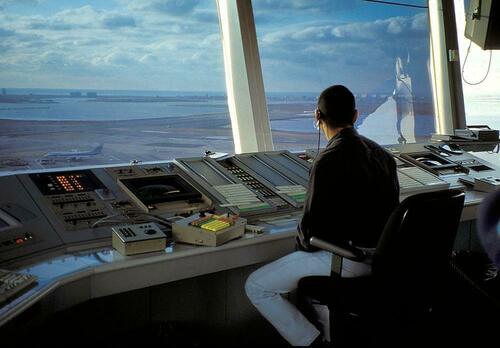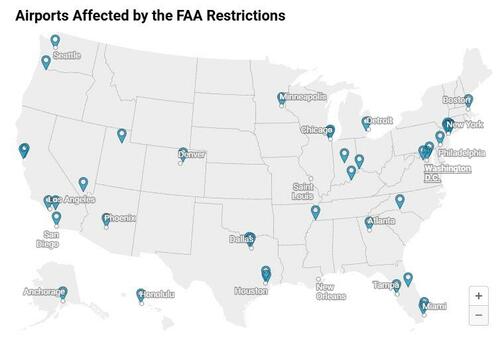The world’s busiest airport and 39 others across the United States were forced to decrease flights by 10 percent starting on Nov. 7.
The Federal Aviation Administration (FAA) announced the decision on Nov. 4, as it struggles with personnel shortages due to the ongoing government shutdown. Those flight controllers who stay on continue to work without pay.
“We can’t ignore it,” FAA Administrator Bryan Bedford said at a press conference on Nov. 4.
“If the pressures continue to build even after we take these measures, we’ll come back and take additional measures.”
Beford added that he was unaware of the FAA taking any measures like this in his 35 years in the aviation industry.
As we noted previously, the list of affected airports was expected to be released on Nov. 6.
The list - obtained by The Associated Press - spans the country, affecting air travel to and from 24 states and several hubs for major passenger carriers including United Airlines, Delta Airlines, American Airlines, Southwest, Jet Blue, Alaska Airlines, and Hawaiian Airlines.
As T.J.Muscaro details below for The Epoch Times, the list includes Hartsfield-Jackson International Airport in Atlanta, which is considered to be the busiest airport in the world; Memphis International Airport, which is a FedEx Superhub and considered the second-busiest cargo airport in the world; and global access points such as John F. Kennedy International Airport, Miami International Airport, and Los Angeles International Airport.
The airports affected are:
Ted Stevens Anchorage International in Alaska.
Hartsfield-Jackson Atlanta International in Georgia
Boston Logan International in Massachusetts
Baltimore/Washington International in Maryland
Charlotte Douglas International in North Carolina
Cincinnati/Northern Kentucky International in Ohio
Dallas Love Field in Texas
Ronald Reagan Washington National in Virginia
Denver International in Colorado
Dallas/Fort Worth International in Texas
Detroit Metropolitan Wayne County in Michigan
Newark Liberty International in New Jersey
Fort Lauderdale/Hollywood International in Florida
Honolulu International in Hawaii
Houston Hobby in Texas
Washington Dulles International in Virginia
George Bush Houston Intercontinental in Texas
Indianapolis International in Indiana
John F. Kennedy International in New York
Harry Reid International Airport in Las Vegas
Los Angeles International in California
LaGuardia Airport in New York
Orlando International in Florida
Chicago Midway International in Illinois
Memphis International in Tennessee
Miami International in Florida
Minneapolis/St Paul International in Minnesota
Oakland International in California
Ontario International in California
Chicago O`Hare International in Illinois
Portland International in Oregon
Philadelphia International in Pennsylvania
Phoenix Sky Harbor International in Arizona
San Diego International in California
Louisville International in Kentucky
Seattle/Tacoma International in Washington
San Francisco International in California
Salt Lake City International in Utah
Teterboro in New Jersey
Tampa International in Florida
According to data from the FlightAware tracking service, there were more than 2,350 delays within, into, or out of the United States as of noon on Thursday, Oct. 6, with approximately 50 cancellations reported.
The FAA directs more than 44,000 flights daily, including cargo, commercial passenger, and private planes. Restrictions, it said, would remain in place as long as necessary, and they come just weeks before the nation enters one of the busiest travel periods of the year for Thanksgiving and the Christmas season.
“As we come into Thanksgiving, if we’re still in the shutdown posture, it’s going to be rough out there. Really rough,” Transportation Secretary Sean Duffy told Fox News in an interview on Nov. 6.
“And we‘ll mitigate the safety side, but will you fly on time? Will your flight actually go? That is yet to be seen, but there’ll be more disruption.”
These restrictions would end with the government shutdown, which has been ongoing for more than a month due to the inability of a continuing resolution bill to pass the Senate.
Republicans currently hold a 53–47 majority in the Senate. However, 60 Senators need to vote yes in order to move the bill forward. Republican lawmakers continue to criticise Democratic lawmakers for continuing to vote no and failing to fund the government.
“I don’t have access to money to pay air traffic controllers during this shutdown,” Duffy said on X.
“Congress has said there is no money. I’d love to pay them, but I can’t. My message to Democrats is to sit down, figure it out, and not hold the American people hostage—especially when they want to travel.”
The Epoch Times has reached out to the FAA for comment.
Loading recommendations...

